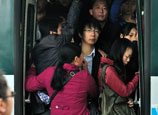
One solution may be the greater involvement of younger returnees, who, although getting on in years themselves, are still appreciably younger than many of their fellow residents and can offer a helping hand.
Warning systems
Meanwhile, local governments now seem to be responding, at least on the issue of security. Following the murders in Shangnan, the county government provided funding to enable isolated villages, where there are often large distances between the houses, to install warning sirens. When a siren is activated, a red light begins to flash, alerting those within a radius of several hundred meters of a possible threat to residents.
In addition, every elderly person in Heigou village has taken advantage of a registration scheme provided by local police, so their safety can be monitored and identification made easier in the event of accident or worse.
In addition, villages with a large number of left-behind seniors can help themselves. The "younger" villagers have been urged to organize patrols to identify problems and keep an eye on any strangers, who are easy to spot in rural communities where everybody knows everybody else, even if only by sight.
The children who have left to work in cities can also play a larger role in the lives of their elderly parents, according to Shi, who said that the young need to realize that simply sending money home is not enough. The young should maintain better contact with villagers to help monitor conditions and not just rely on the assurances provided by their uncomplaining parents.
One solution would be to introduce a number of support facilities to improve the quality of life and help the elderly to enjoy the time remaining to them. "Even though urbanization means rural depopulation, it does not necessarily mean that we should sacrifice the happiness of any particular group," said Wang Junwen.
Sitting on his riverbank, Cheng Deguang said he knows it would be unrealistic to expect to have his children around him, but the help he receives from neighbors is crucial and appreciated.
"Sometimes the younger villagers help me to carry the seeds and fertilizers I use for work on the land. They are really very helpful, almost like a family," he said.
Frail, lonely and isolated
In March, in a village in Foshan, Guangdong province, thieves broke into 12 deserted houses, stealing everything they could carry. One 70-year-old villager named Xian lost 3,000 yuan ($488) in savings he had left in his old house. Luckily, no one was hurt because the elderly residents had been moved into new houses earlier in the year. However, as many of them were unsure about the new accommodation, they left possessions and caches of valuables and cash in their former homes.
Locals said the villagers, most of whom were left-behind seniors, had been feeling increasingly insecure. There are no security systems in the village and autos, electrical wiring and even family dogs were being stolen as the number of raids increased.
Some of those who suffered losses were reluctant to report the thefts to the police for fear of reprisals by the thieves, while others mistakenly thought they would have to pay the police to attend the crime scene. The isolation bred fear and made the elderly residents feel even less secure.
But theft and the threat of violence aren't the only enemies of the elderly. Last winter, an 80-year-old resident of an isolated village in the Inner Mongolia autonomous region died in a fire at his home. More than 30 villagers attempted to extinguish the flames, but were too old and frail to do so.
Lacking protection and the reassuring presence of younger people, elderly villagers often encounter dangerous situation they simply can't tackle on their own.

















 Chinese applicants wish a new life on Mars
Chinese applicants wish a new life on Mars


![]()
